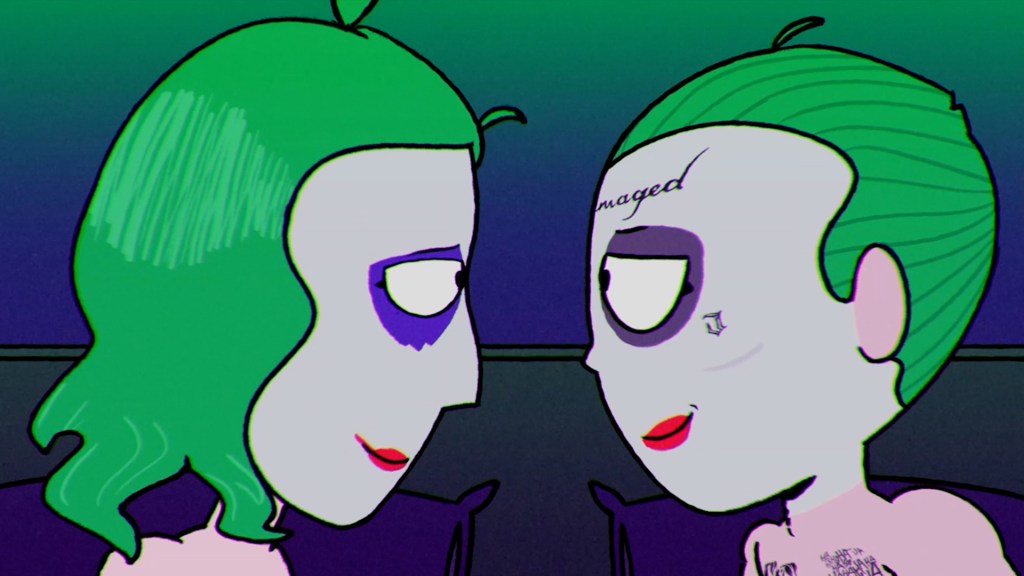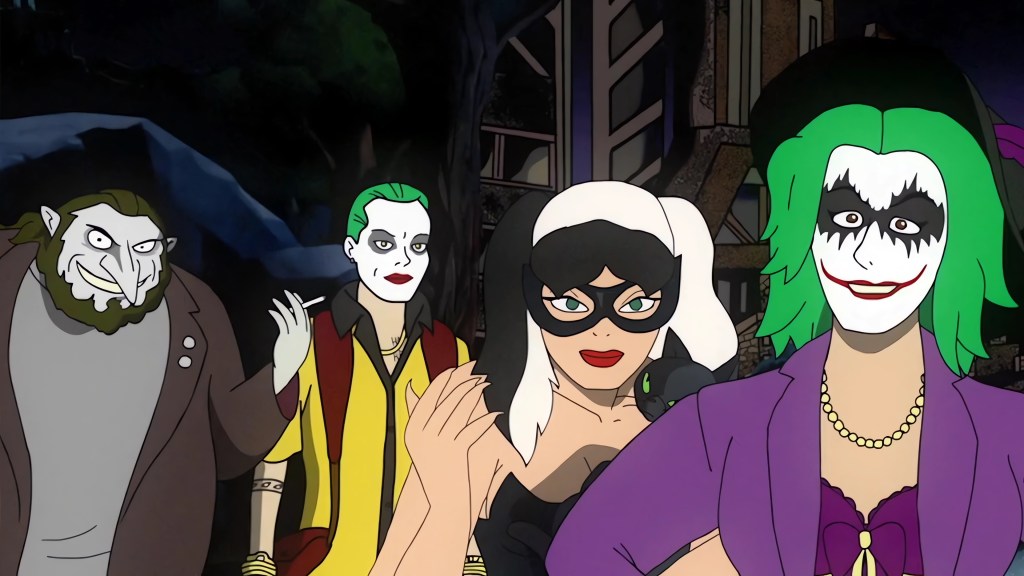Superhero comics have always fared pretty well with straight teenage boys because they represent adolescent power fantasies. Costumed heroes can do what these kids only wish they could, operating toward their own forms of justice without constraints. There’s one for every personality type, whether the reader would rather be highly disciplined like Batman, berserk like Wolverine, or as psychotic as the Punisher.
There are many other types of comics and heroes, of course, but our popular culture on the whole has favored this demographic. So what if someone from a totally different demographic flipped the form on its head, revealing the fantasy they derived from comic-book movies, even if it wasn’t necessarily intended?
Rubber Nipple Reclamation
Comedy editor-director and trans woman Vera Drew was dared by a friend to re-edit Todd Philips’ Joker, after Phillips made the standard lazy comments about how comedy is too much of a minefield these days because everyone is easily offended. While remixing that take, however, Drew recalled the role Batman Forever played in her own trans awakening, as she realized she identified with Nicole Kidman rather than Batman. The work in progress became a lot more — not just a remix and blend of every Batman movie (up to and including Suicide Squad and Joker) with a queer sensibility, but Drew’s own coming-of-age tale, through the filter of a Joker who longs to be a Harley.

Utilizing miniatures, superimpositions, 2D and 3D animation that varies from “bizarre” to “deliberately bad,” and songs that vary from industrial music to show tunes and Prince parodies, The People’s Joker feels like an underground mix tape, with uncleared samples judiciously replaced with covers, and occasional usage of real and trademarked names and faces justified by Fair Use, as if parodied on a feature length RuPaul’s Drag Race challenge sketch (though Mama Ru is not immune from the barbs herein). The band Negativland, most famous for repurposing elements of U2’s music and iconography, are cited as a significant influence; the underground DJ culture of sampling and transformation infuses every frame.

Drew, as “Joker the Harlequin,” narrates the tale, and sometimes plays it as a female riff on Joaquin Phoenix’s Arthur Fleck. Newcomer Kane Distler plays a Jared Leto-ish “Mr. J” as a trans man, and follows through on the old fan theory that he was previously Jason Todd…AND Carrie Kelly.
Upright Citizens of Gotham
It’s sort of set in a version of the DC Universe, and sort of not, with a focus on stand-up comedy, which has all been outlawed except at UCB, which in this reality stands for United Clown Bureau, and is run by a CG Lorne Michaels (Maria Bamford). It’s as much Scientology-esque pyramid scheme as it is comedy show, with Michaels blatantly favoring straight white men with small penises. Ever the rebel, Joker the Harlequin starts an anti-comedy club along with fellow UCB dropout Penguin (Nathan Faustyn). But when Batman un-retires, will he get the prime gig hosting UCB’s headline show, or can Joker the Harlequin discover her real self and take charge?

Worrying too much about literal plot logic is a mistake, and one the film itself sometimes makes. The live-action footage was shot in five days, and it occasionally shows — Drew is not the world’s most experienced dramatic actor, and scenes that feel like they should be serious tend to drag (no pun intended) a bit. On the other hand, this works in a self-referential sense.
Joker the Harlequin is constantly told that good comedians don’t tell jokes, but tell things true to themselves. Likewise, Drew resonates truly and sincerely when telling her story, and not so much when going through the motions of strictly movie-based plot. The experimental mixture of styles and storytelling works best when you can’t figure out which is which.
Superstar
Like a kid using licensed action figures (or Todd Haynes telling the Karen Carpenter story with Barbie dolls) to tell their own story, and damn the artificially imposed limits of the source material, Vera Drew uses DC IP as a method of remixing and repurposing familiar touchstones to portray her truth. Batman movies aren’t the only ingredients: Teen Wolf, A Nightmare on Elm Street Part 2, Boyhood, InfoWars, Ralph Bakshi, and the entire UCB-to Saturday Night Live pipeline are among the ingredients of this not-so-smoothie. It doesn’t quite hit the X-rated level of classic underground adult comix like Zap, but watching it feels like discovering college radio after a diet of Clear Channel. It’s cheap because it has to be in order to get made, but the creativity shines through the lo-fi tools.

The People’s Joker is partly dedicated to the late director Joel Schumacher, whose Batman films infamously got a lot of homophobia-tinged hate over such touches as the anatomically specific costumes. Schumacher, a former costume designer, always resisted claims he was giving Batman a gay subtext, insisting to his dying day that people only said that because they knew he himself was gay. Rather, on the Blu-ray commentaries, he made it clear he thought comics are inherently silly, and used his elementary school-aged nephew as a primary source of information on them.
Camp Damascus
Schumacher’s own denials made it more difficult to reclaim his films as subversive camp, yet Vera Drew has now pointedly, subversively reclaimed elements of all the movies — Burton, Schumacher, Nolan, Snyder, et al — as the personal allegorical beats individual viewers may want or need them to be. There could be no clearer example of the notion that art, when put out into the world, belongs to the audience rather than the creator(s) forever after.
Grade: 4/5
The People’s Joker opens in theaters April 5th.




